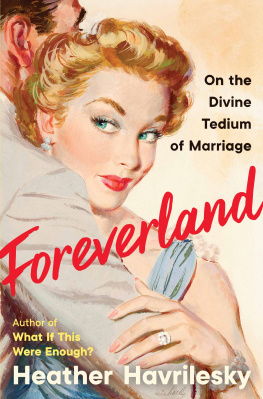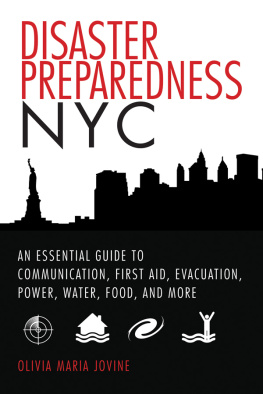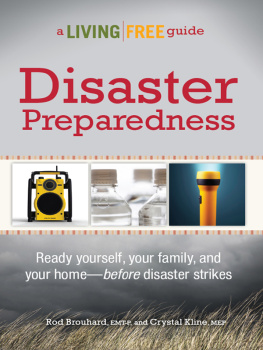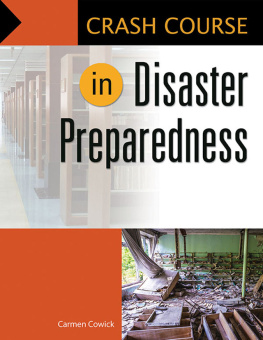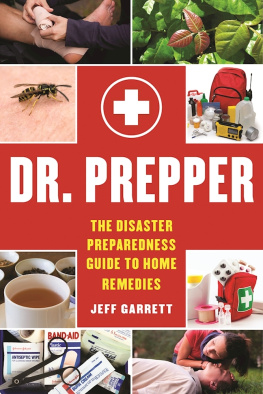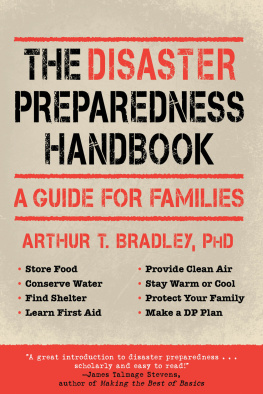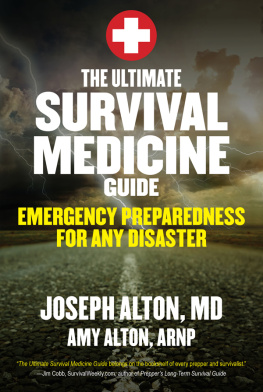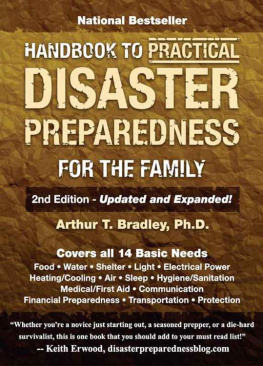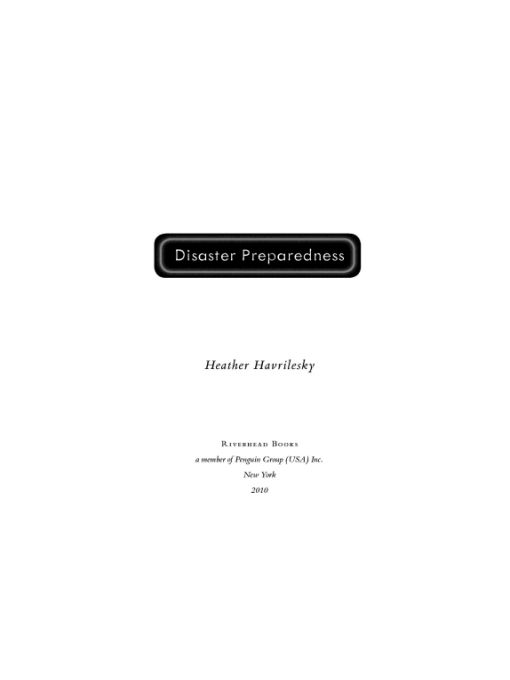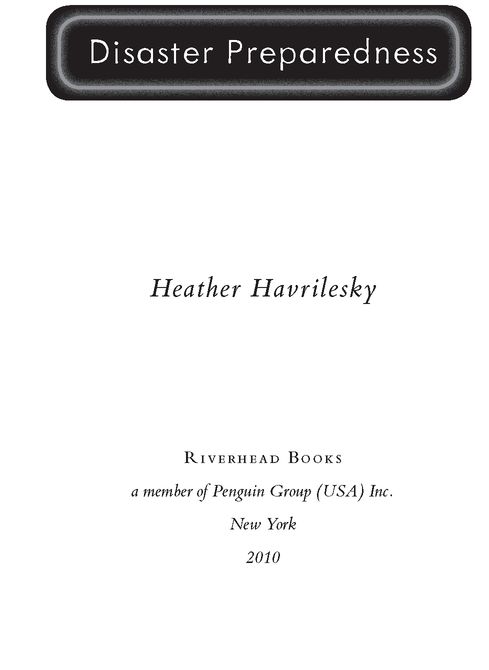Table of Contents
FOR MY MOTHER,
who still bakes a damn good cherry pie
Although the stories in this book are true, certain names and
identifying characteristics of some people portrayed here
have been changed to protect their privacy.
Introduction
Growing up during the 70s, I found it hard to avoid the specter of disaster. On every movie screen, airplanes plummeted to the ground, earthquakes toppled huge cities, and monster sharks ripped teenagers to bloody bits. But more disturbing than the catastrophes themselves was the utter lack of foresight demonstrated by the adults in each harrowing scene. As meteors hurtled toward Earth and gigantic dinosaurs crushed cars under their feet, grown adults either ran screaming or stood in confused clusters, gasping and shrugging over what was to be done.
Why wasnt there a plan? I always wondered. How could so many adults stare blankly at each other as everything went to hell?
Once I asked my mom what we would do if a meteor crashed into the house. The chances of that happening are very slim, she told me. But it could happen, I told her, and I needed to know what to do if it did.
Well, we wouldnt be able to do anything. The house would explode in flames and wed all be incinerated in seconds. My mom thought about that for a second. But thats not a terrible way to die, compared to getting really sick or maimed and having to be wheeled around or kept alive with tubes forever.
My mom was about as bad at reassuring a little kid that the world was a safe place as anyone could be. She would start out on the right track, but then give up almost immediately, exhausted by the effort of forming optimistic lies she didnt believe. Some people think that theres a heaven, shed start out saying when some pet or distant relative died and I wanted to know what would happen to them, but Ive always thought that was wishful thinking, honestly. Or: The chance of lightning striking the house is something like a million to one... but, then again, it did strike that tree in the side yard last year, didnt it? And we are on a hill, covered by tall trees.
Despite my moms acceptance of our potential annihilation, I knew there had to be a way out of any bad situation. In every disaster movie ever made, no matter what cataclysmic scenario was unfolding, there was always a way to avoid death, if you had a plan. But you had to have a plan. So my sister Laura and I decided that it was up to us to form a strategy for handling each potential emergency, from natural disasters to nuclear war to unlikely crime scenarios like dognapping.
In case of a tornado, we concluded that we should grab the pets and as many cans of mini-ravioli as we could carry and hide in the basement. If there was a nuclear attack, we resolved to seal all the windows with aluminum foil and duct tape and take showers every two hours. In case of a flood, we agreed that the best move was to inflate the little raft in the garage and haul it up to the roof so wed be safe until the water rose very high.
Our plans werent always logical. In case our house caught on fire, for example, I was supposed to grab my teddy bear and our dog, Madge, stuff them into a pillow, and throw them out the window. My sister was in charge of rescuing the cat and the Star Wars action figures. Next, wed throw one of our mattresses out the window, and then jump out the window and land on the mattress.
This wasnt the soundest approach, considering that there was a perfectly good fire-escape ladder in the hall closet upstairs. But we had never used that ladder, so we werent sure how it worked. In fact, my mom would mention at least once or twice a year that we really needed to test that fire-escape ladder. Just spotting the box in the closet gave me a sinking feeling inside. A picture on the front of it showed a voluptuous woman in a tiny nightgown, lightly stepping down a chain ladder amid a raging fire. She bore an uncanny resemblance to Farrah Fawcett, and not only looked calm but had a slight smile on her face as red and orange flames licked at the hem of her nightie.
This image of poise in the face of adversity struck me as utterly fantastical. My sister and I knew better than to put our faith in such a traditional, accepted means of rescue. The people who did that in the moviesexited calmly with the crowd, trusted the lifeboats, followed the posted signswere always the ones to perish first. Only a small band of survivors willing to plot out their own escape route and battle their way through untold mishaps had any hope of making it out alive.
We never ran our emergency drills by my mom, who mightve liked to know that if there was a fire, her two daughters would die struggling to shove a mattress out the window. But it seemed more reassuring to have a plan that our parents werent in on, maybe because we didnt always trust their judgment under duress. Childhood is a wild, unpredictable ride whether your parents are good drivers or not, and our parents alternated between puttering along cautiously and careening all over the road, shouting at each other as they swerved and fishtailed through uncharted territory.
The stakes always felt unnervingly high. But even though we could crash at any second, we still enjoyed the scenery together. Some spirit of recklessness and longing attracted my parents to each other, and we were enlisted in their strange bond. We echoed their hotheaded tirades, we matched their loud, cackling laughter, we soaked in their ambient melancholy. They were young and opinionated and stubborn and overwhelmed by violent emotions; we were caught in their undertow. Even my earliest memories are vibrant and sweet and vaguely menacing: a loud fight, a silly song, a made-up game, an hour of sullen silence, a walk among the fireflies at twilight. We loved our king and queen, but their kingdom was an untamed and volatile place.
And then there was the larger world outside, with its fearmongering teachers and anxious bullies, its fickle boys and sadistic cheerleading coaches and bad bosses and disapproving friends and indifferent but watchful strangers. The claustrophobia of our odd little gang of five gave way to a wider universe that was even more bewildering. Maybe we grew up during a particularly reckless decade, when people drove fast in cars without functioning seat belts and let their dogs run free through the neighborhood as a pack, chasing cars and terrorizing cats. Or maybe my mom and dad were particularly invested in making us aware of just how cruel and unforgiving the world could be. Their blustery jokes and self-assured swagger belied a deeply pessimistic, dark view, in which people were assumed to be selfish or unjust or careless or deluded or all of the above.
But this isnt the story of my parents failures, or how the world beat me up or let me down. Instead, I chart my trajectory from expecting way too muchfrom my parents, from the world, from myselfto then, later, as a coping strategy, expecting way too little. Like most children, I was unaware that my path to disillusionment was a thoroughly trampled one: I put my faith in a loving and all-powerful God, and then one day suspected that we were all alone on our tiny sphere, sailing through an enormous universe, fragile and unprotected. I believed that my parents could keep me from everything bad in the world, and then one day I recognized that they were relatively powerless, whether they were grappling with a potential catastrophe or their own shortcomings.


